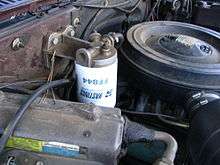Fuel filter

A fuel filter is a filter in the fuel line that screens out dirt and rust particles from the fuel, normally made into cartridges containing a filter paper. They are found in most internal combustion engines.
Fuel filters serve a vital function in today's modern, tight-tolerance engine fuel systems. Unfiltered fuel may contain several kinds of contamination, for example paint chips and dirt that has been knocked into the tank while filling, or rust caused by moisture in a steel tank. If these substances are not removed before the fuel enters the system, they will cause rapid wear and failure of the fuel pump and injectors, due to the abrasive action of the particles on the high-precision components used in modern injection systems. Fuel filters also improve performance, as the fewer contaminants present in the fuel, the more efficiently it can be burnt.
Fuel filters need to be maintained at regular intervals. This is usually a case of simply disconnecting the filter from the fuel line and replacing it with a new one, although some specially designed filters can be cleaned and reused many times. If a filter is not replaced regularly it may become clogged with contaminants and cause a restriction in the fuel flow, causing an appreciable drop in engine performance as the engine struggles to draw enough fuel to continue running normally.
Some filters, especially found on diesel engines, are of a bowl-like design which collect water in the bottom (as water is more dense than diesel). The water can then be drained off by opening a valve in the bottom of the bowl and letting it run out, until the bowl contains only diesel. Many fuel filters contain a water sensor to signal to the engine control unit or directly to the driver (lamp on dashboard) if the water reach the warning level. It is especially undesirable for water in fuel to be drawn into a diesel engine fuel system, as the system relies on the diesel for lubrication of the moving parts, and if water gets into a moving part which requires constant lubrication (for example an injector valve), it will quickly cause overheating and unnecessary wear. This type of filter may also include a sensor, which will alert the operator when the filter needs to be drained. In proximity of the diesel fuel filter there might be a fuel heater to avoid the forming of paraffin wax (in case of low temperatures) inside the filtrating element which can stop the fuel flow to the engine.
External links
 Media related to Fuel filters at Wikimedia Commons
Media related to Fuel filters at Wikimedia Commons- Replacing a fuel filter, a free video from CDX eTextbook.
- Detailed fuel filter replacement instructions
- Fuel filter cross reference
{{Navbox
|name =Automotive engine
|state =collapsed
|title =Automotive engine
|listclass =hlist
|above =Part of the Automobile series
|group1 =Basic terminology |list1 =
- Compression ratio
- Crank
- Cylinder
- Dead centre
- Diesel engine
- Dry sump
- Engine balance
- Engine configuration
- Engine displacement
- Engine knocking
- Firing order
- Hydrolock
- Petrol engine
- Power band
- Redline
- Spark-ignition engine
- Stroke
- Stroke ratio
- Wet sump
|group2 =Main components |list2 =
- Connecting rod
- Crankcase
- Crankpin
- Crankshaft
- Crossflow cylinder head
- Crossplane
- Cylinder bank
- [[]
- Starter ring gear
- Sump
|group3 =Valvetrain |list3 =
- Cam
- Cam follower
- Camshaft
- Desmodromic valve
- Hydraulic tappet
- Multi-valve
- Overhead camshaft
- Overhead valve
- Pneumatic valve springs
- Poppet valve
- Pushrod
- Rocker arm
- Sleeve valve
- Tappet
- Timing belt
- Timing mark
- Valve float
- Variable valve timing
|group4 =Aspiration |list4 =
- Air filter
- Blowoff valve
- Boost controller
- Butterfly valve
- Centrifugal-type supercharger
- Cold air intake
- Dump valve
- Electronic throttle control
- Forced induction
- Inlet manifold
- Intake
- Intercooler
- Manifold vacuum
- Naturally aspirated engine
- Ram-air intake
- Scroll-type supercharger
- Short ram air intake
- Supercharger
- Throttle
- Throttle body
- Turbocharger
- Twin-turbo
- Variable-geometry turbocharger
- Variable-length intake manifold
- Warm air intake
|group5 =Fuel system |list5 =
- Carburetor
- Common rail
- Direct injection
- Fuel filter
- Fuel injection
- Fuel pump
- Fuel tank
- Gasoline direct injection
- Indirect injection
- Injection pump
- Lean-burn
- Stratified charge engine
- Turbo fuel stratified injection
- Unit injector
|group6 =Ignition |list6 =
- Contact breaker
- Magneto
- Distributor
- Electrical ballast
- High tension leads
- Ignition coil
- Spark plug
- Wasted spark
|group7 =
management
|list7 =
- Air–fuel ratio meter
- Alternator
- Automatic Performance Control
- Car battery (lead–acid battery)
- Crankshaft position sensor
- Dynamo
- Drive by wire
- Electronic control unit
- Engine control unit
- Engine coolant temperature sensor
- Glow plug
- Idle air control actuator
- MAP sensor
- Mass flow sensor
- Oxygen sensor
- Starter motor
- Throttle position sensor
|group8 =Exhaust system |list8 =
- Automobile emissions control
- Catalytic converter
- Diesel particulate filter
- Exhaust manifold
- Glasspack
- Muffler
|group9 =Engine cooling |list9 =
- Air cooling
- Antifreeze (ethylene glycol)
- Core plug
- Electric fan
- Fan belt
- Radiator
- Thermostat
- Water cooling
- Viscous fan (fan clutch)
|group10 =Other components |list10 =
- Balance shaft
- Block heater
- Combustion chamber
- Cylinder head porting
- Gasket
- Motor oil
- Oil filter
- Oil pump
- Oil sludge
- PCV valve
- Seal
- Synthetic oil
- Underdrive pulleys
|belowclass =hlist |belowstyle =font-weight:bold; |below =
- Portal
- Category
}}